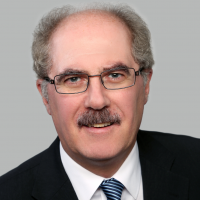The Fall of the Wall at 20: Global Consequences Today

James D. Bindenagel
University of Bonn
James D. Bindenagel is a retired U.S. Ambassador, Henry-Kissinger-Professor (Emeritus) at Bonn University, and Senior Non-Resident Transatlantic Fellow at the German Marshall Fund of the United States. He has published: Germany: From Peace to Power? Can Germany Lead in Europe without Dominating it? (2020) and International Sicherheit im 21. Jahrhundert, Deutschlands Verantwortung (2015), both published by V&R Bonn for Bonn University.

Klaus Larres
University of North Carolina in Chapel Hill
Klaus Larres is a DAAD/AICGS Research Fellow from February through April 2022. He is the Richard M Krasno Distinguished Professor of History and International Affairs at the University of North Carolina (UNC) at Chapel Hill. He served as a Counselor and Senior Policy Adviser at the German Embassy in Beijing, China. Larres is the former holder of the Henry A. Kissinger Chair in Foreign Policy and International Relations at the Library of Congress in Washington, DC, and a Member/Fellow of the Institute of Advanced Study (IAS) in Princeton, NJ. He also was the Clifford Hackett Visiting Professor of European History at Yale and a Fellow at the German Institute for International and Security Affairs (SWP) in Berlin, where he focused on German-Chinese relations. He was a Visiting Professor at Schwartzman College/Tsinghua University in Beijing, Tongji University in Shanghai, the Beijing Language and Culture University, as well as at Johns Hopkins University SAIS and the Woodrow Wilson Center in Washington, DC. He has held full-time professorial positions at Queen’s University Belfast and the University of London. He is also a non-residential Distinguished Visiting Professor at the Indian Institute of Technology (IIT) in Mumbai, India.
Larres has published widely on transatlantic relations, the Cold War, and U.S.-China-Europe relations in the 20th and 21st centuries. His latest books are entitled Uncertain Allies: Nixon, Kissinger and the Threat of a United Europe (Yale UP, 2022); Dictators and Autocrats: Securing Power Across Global Politics, ed. (Routledge, 2022); Terrorism and Transatlantic Relations: Threats and Challenges, co-ed. (Palgrave Macmillan, 2022); Understanding Global Politics: Actors and Themes in International Affairs, co-ed. (Routledge, 2020), German-American Relations in the 21st Century: A Fragile Friendship, ed. (Routledge, 2019); and many other books, including Churchill’s Cold War: The Politics of Personal Diplomacy (Yale UP, 2002), as well as many articles on U.S.-China-Germany/EU relations. He runs the Krasno Global Affairs & Business Council/Krasno Global Events Series at UNC and frequently contributes to the international media.
His DAAD/AICGS research project, “Breaking Up is Hard to Do: China as a Cause of German-American Tension in Transatlantic Relations,” will compare and analyze the different approaches the United States and Germany have taken in their relations with China since the early 2000s. The study explores why at times this has led to intense transatlantic disagreements and investigates whether or not different perceptions of the value of economic and political relations with China as well as historical experiences have been influential in both countries’ divergent views and strategies toward China. The study then explores how the fissure in German-American and transatlantic relations regarding China can be overcome.
German-American Issues 12
When East Germans first crossed through the Berlin Wall on 9 November 1989, no one knew that the consequences of this one small act would have global ramifications, bringing about the end of the forty year Cold War, and transforming the framework of global politics. The past twenty years have shown that the fall of the Berlin Wall is far from being just an end-point; rather, it was the beginning of a new era in German-American relations, in transatlantic cooperation, and in global affairs. The authors of German-American Issues 12 – J.D. Bindenagel, Manuel Lafont Rapnouil, Klaus Larres, and Holger Wolf – reflect on these and other consequences of the events of November 1989, proving that that historic moment is just as relevant today as it was twenty years ago.








